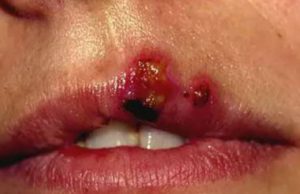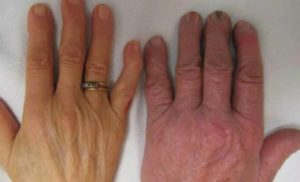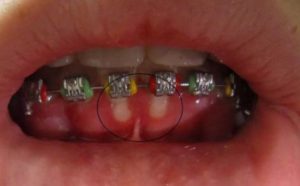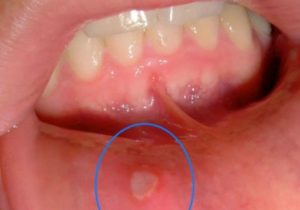
These sores can appear on any of the soft tissues of your mouth, including your lips, cheeks, gums, tongue, and floor and roof of your mouth. You can even develop mouth sores on your esophagus, the tube leading to your stomach.
Mouth sores, which include canker sores, are usually a minor irritation and last only a week or two. In some cases, however, they can indicate mouth cancer or an infection from a virus, such as herpes simplex.
Conditions that cause mouth sores
Different conditions can cause mouth sores. Here is a list of 13 possible causes.
Warning: Graphic images ahead.
Cold sore

- Red, painful, fluid-filled blister that appears near the mouth and lips
- Affected area will often tingle or burn before the sore is visible
- Outbreaks may also be accompanied by mild, flu-like symptoms such as low fever, body aches, and swollen lymph nodes
Anemia

- Symptoms occur when your red blood cells are so reduced, damaged, or impaired that you have problems transporting enough oxygen throughout your body
- Symptoms include pale, cold skin, pale gums, dizziness, light-headedness, fatigue, increased or decreased blood pressure, and racing or pounding heart
- Anemia has many causes and may occur quickly (such as after an injury or surgery) or over a long period of time
Gingivomatitis

- Gingivomatitis is a common infection of the mouth and gums, often seen in children
- It produces tender sores on the gums or insides of cheeks; like canker sores, they appear grayish or yellow on the outside and red in the center
- It also causes mild, flu-like symptoms
- It may lead to drooling and pain with eating, especially in young children
Infectious mononucleosis

- Infectious mononucleosis is usually caused by the Epstein-Barr virus (EBV)
- It mainly occurs in high school and college students
- Symptoms include fever, swollen lymph glands, sore throat, headache, fatigue, night sweats, and body aches
- Symptoms may last for up to 2 months
Canker sores

- Canker sores are also called aphthous stomatitis or aphthous ulcers
- They are small, painful, oval-shaped ulcers on the inside of the mouth that appear red, white, or yellow in color
- They are usually harmless and heal on their own in a couple of weeks
- Recurrent ulcers may be a sign of other diseases, such as Crohn’s disease, celiac disease, vitamin deficiency, or HIV
Folate deficiency

- Folate is an important B vitamin used to make and repair DNA and is critical to proper neural tube development in embryos
- Anemia, or low red blood cells, is the most common result of folate deficiency
- Symptoms include fatigue, weakness, pale skin, fatigue, mouth sores, tongue swelling, gray hair, and growth delay
Oral thrush
- This is a yeast infection that develops on the inside of your mouth and on your tongue
- It’s most common in infants and children, but it may be a sign of weakened immune system in adults
- Creamy white bumps appear on the tongue, inner cheeks, gums, or tonsils that can be scraped off
- Symptoms include pain at the site of the bumps, loss of taste, and difficulty swallowing
- Dry, cracked skin at the corners of the mouth is another possible symptom
Hand, foot, and mouth disease
- Usually affects children under age 5
- Painful, red blisters in the mouth and on the tongue and gums
- Flat or raised red spots located on the palms of the hand and soles of the feet
- Spots may also appear on the buttocks or genital area
Leukoplakia
- Leukoplakia causes thick, white patches on your tongue and the lining of your mouth that may be raised, hard, or have a “hairy” appearance
- It’s commonly seen in smokers
- Leukoplakia is usually harmless and often goes away on its own, but more serious cases may be linked to oral cancer
- Regular dental care can help prevent recurrences
Oral lichen planus
- This chronic inflammatory disorder affects the gums, lips, cheeks, and tongue
- White, lacy, raised patches of tissue in the mouth resemble spiderwebs or tender, swollen patches that are bright red and may ulcerate
- Open ulcers may bleed and cause pain when eating or brushing teeth
Celiac disease

- Celiac disease is an abnormal immune system response to gluten that damages the lining of the small intestine
- Damage to the small intestine villi leads to poor absorption of important dietary nutrients like B vitamins, vitamin D, iron, and calcium
- Symptoms range in severity and may differ between adults and children
- Common adult symptoms include diarrhea, weight loss, stomach pain, anemia, joint pain, bloating, gas, fatty stools, skin rash, and mouth sores
- Common symptoms in children include weight loss, growth delay, delayed puberty, chronic diarrhea or constipation, stomach pain, and yellow/discolored teeth
Mouth cancer

- This cancer affects any of the working parts of your mouth or oral cavity including lips, cheeks, teeth, gums, front two-thirds of the tongue, roof, and floor of the mouth
- Ulcers, white patches, or red patchs appear inside the mouth or on the lips that do not heal
- Weight loss, bleeding gums, ear pain, and swollen lymph nodes in the neck are other symptoms
Pemphigus vulgaris
- Pemphigus vulgaris is a rare autoimmune disease
- It affects the skin and mucous membranes of the mouth, throat, nose, eyes, genitals, anus, and lungs
- Painful, itchy skin blisters appear that break and bleed easily
- Blisters in the mouth and throat may cause pain with swallowing and eating
What are the symptoms of mouth sores?
In most cases, mouth sores cause some redness and pain, especially when eating and drinking. They can also cause a burning or tingling sensation around the sore. Depending on the size, severity, and location of the sores in your mouth, they can make it difficult to eat, drink, swallow, talk, or breathe. The sores may also develop blisters.
Contact your healthcare provider if you experience any of the following symptoms:
- sores that are larger than half an inch in diameter
- frequent outbreaks of mouth sores
- rash
- joint pain
- fever
- diarrhea
What causes mouth sores?
Several things can lead to mouth sores, ranging from minor everyday causes to serious illnesses. Usually, a mouth sore might develop if you:
- bite your tongue, cheek, or lip
- burn your mouth
- experience irritation from a sharp object, such braces, retainer, or dentures
- brush your teeth too hard, or use a very firm toothbrush
- chew tobacco
- have the herpes simplex virus
Healthcare providers don’t know what causes canker sores. However, these sores aren’t contagious. You may be more prone to them due to:
- a weakened immune system because of illness or stress
- hormone changes
- a vitamin deficiency, especially of folate and B-12
- intestinal issues, such as Crohn’s disease or irritable bowel syndrome (IBS)
Occasionally, mouth sores are the result of — or a reaction to — the following:
- over-the-counter or prescription medications
- gingivostomatitis
- infectious mononucleosis
- oral thrush
- hand, foot, and mouth disease
- radiation or chemotherapy
- autoimmune disorders
- bleeding disorders
- cancer
- celiac disease
- bacterial, viral, or fungal infection
- a weakened immune system due to AIDS or a recent organ transplant
Do mouth sores need to be diagnosed?
You can usually tell when you have a mouth sore without needing a healthcare provider’s diagnosis. However, you should see your healthcare provider if you:
- have white patches on your sores; this may be a sign of leukoplakia or oral lichen planus
- have, or suspect you may have, herpes simplex or another infection
- have sores that don’t go away or get worse after a couple of weeks
- started taking a new medication
- started cancer treatment
- recently had transplant surgery
During your visit, your healthcare provider will examine your mouth, tongue, and lips. If they suspect you have cancer, they may perform a biopsy and run some tests.
How are mouth sores treated?
Minor mouth sores often go away naturally within 10 to 14 days, but they can last up to six weeks. Some simple home remedies might help reduce the pain and possibly speed up the healing process. You may want to:
- avoid hot, spicy, salty, citrus-based, and high-sugar foods
- avoid tobacco and alcohol
- gargle with salt water
- eat ice, ice pops, sherbet, or other cold foods
- take a pain medication, such as acetaminophen (Tylenol)
- avoid squeezing or picking at the sores or blisters
- apply a thin paste of baking soda and water
- gently dab on a solution that is 1 part hydrogen peroxide and 1 part water
- ask your pharmacist about other over-the-counter medications, pastes, or mouthwash that may be helpful
If you see your healthcare provider for your mouth sores, they may prescribe a pain medication, anti-inflammatory drug, or steroid gel. If your mouth sores are a result of a viral, bacterial, or fungal infection, your healthcare provider might provide a medication to treat the infection.
In cases of mouth cancer, a biopsy will be taken first. Afterward, you may need surgery or chemotherapy.
Can mouth sores be prevented?
There is no absolute way to prevent all mouth sores. However, you can take certain steps to avoid getting them. You should try to:
- avoid very hot foods and drinks
- chew slowly
- use a soft toothbrush and practice regular dental hygiene
- see your dentist if any dental hardware or teeth may be irritating your mouth
- decrease stress
- eat a balanced diet
- reduce or eliminate food irritants, such as hot, spicy foods
- take vitamin supplements, especially B vitamins
- drink plenty of water
- don’t smoke or use tobacco
- avoid or limit alcohol consumption
- shade your lips when in the sun, or use SPF 15 lip balm
Are there any long-term effects of mouth sores?
In most cases, mouth sores have no long-term effects.
If you have herpes simplex, the sores may reappear. In some cases, severe cold sores can leave scarring. Outbreaks are more common if you:
- are under stress
- are ill or have a weakened immune system
- have had too much sun exposure
- have a break in the skin of your mouth
In cases of cancer, your long-term side effects and outlook depend on the type, severity, and treatment of your cancer.